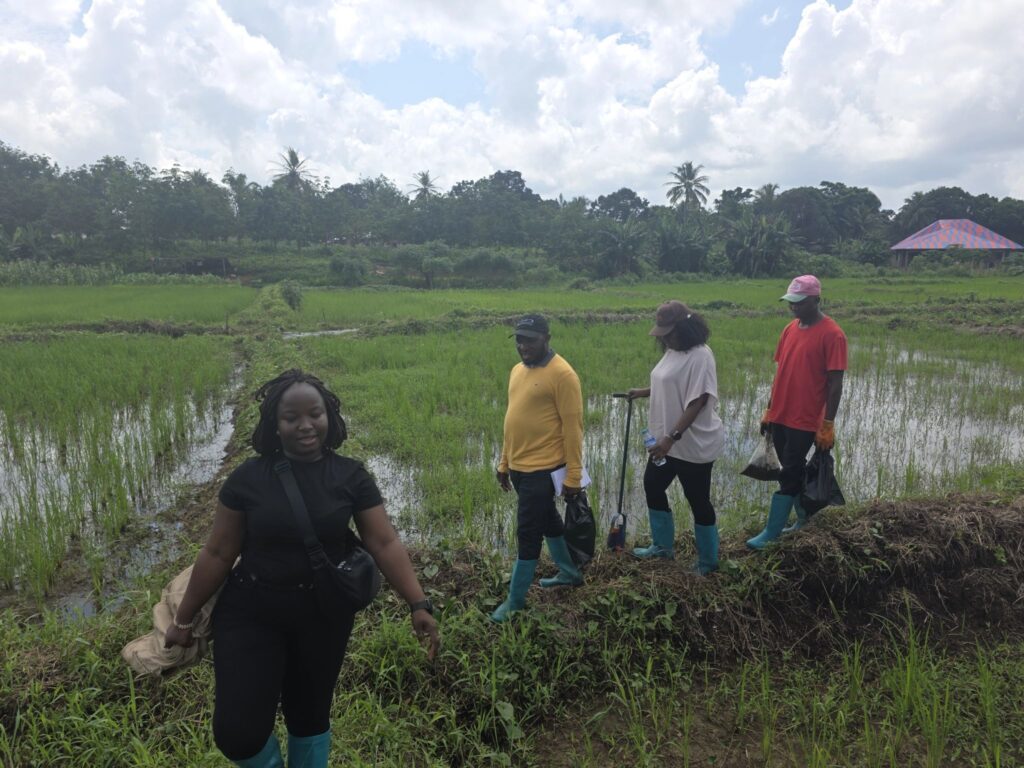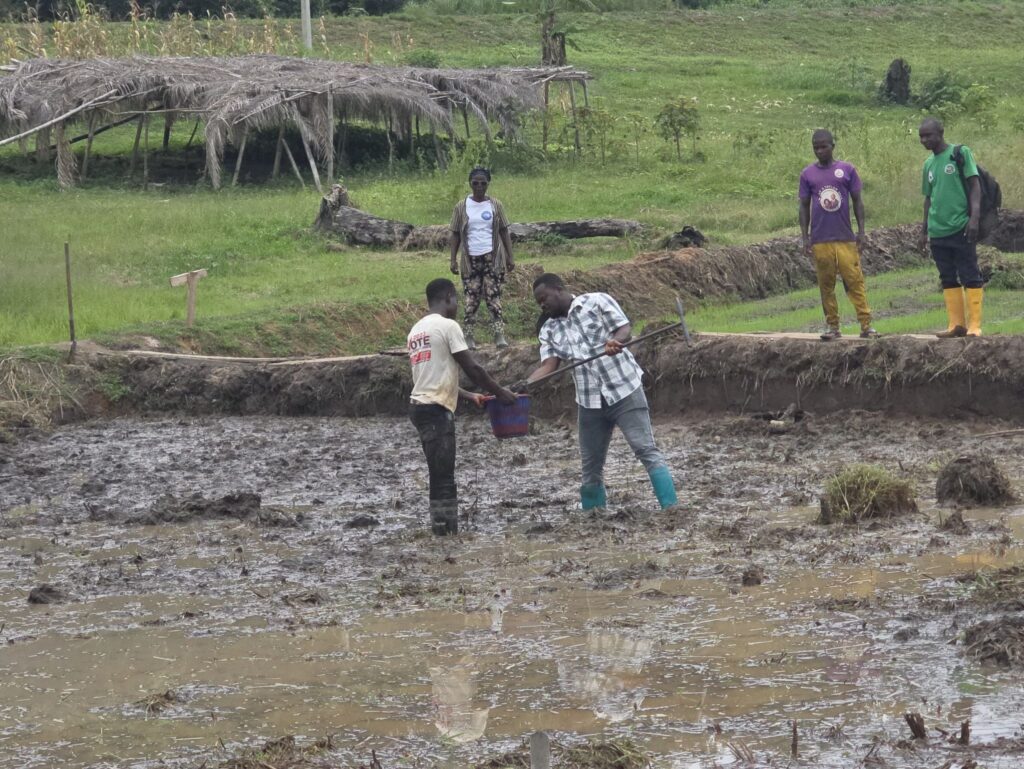
by Ken KOUTCHAKPO
The International Institute of Tropical Agriculture (IITA) is deploying advanced data and AI-driven modelling to boost soil nutrient management, soil health and improve farmer productivity in West Africa, a region experiencing recurrent nutrient depletion due to unsustainable farming practices and injudicious fertilizer use.
Crops remove essential nutrients such as Nitrogen, Phosphorus, and Potassium (NPK) from the soil during growth and harvest. These nutrients are vital for crop development and need to be replenished through the natural decomposition process or the application of mineral fertilisers to avoid the deterioration of soil fertility, which leads to poor yields.
Nutrient mining and inefficient fertiliser use
Farmers in West Africa and the Sahel region experience poor crop yields as they apply fertilisers inefficiently and without a scientific understanding of their soils’ specific nutrient needs.
To address this, the Regional Hub for Fertiliser and Soil Health Hub for West Africa, a collaborative initiative to promote soil health and sustainable fertiliser use in the region, is using data science and advanced modelling to develop site-specific fertiliser recommendations for farmers to improve soil fertility management and productivity.
Launched in 2024 as a sub-program of the Economic Community of West African States (ECOWAS), the Regional Hub brings together diverse stakeholders who include IITA, International Fertilizer Development Center (IFDC), OCP Africa, African Plant Nutrition Institute (APNI), University Mohammed VI Polytechnic (UM6P) and the World Bank through the Accelerating Impacts of CGIAR Climate Research for Africa (AICCRA) project.
The Regional Hub provides technical assistance for the development and implementation of ongoing, new fertiliser and soil health-related investments in Africa. One of its key functions focuses on developing site-specific fertiliser recommendations tailored to local soil conditions and crop needs using high-quality agronomic datasets and cutting-edge data science techniques.
The fertiliser recommendations align with the principles of Integrated Soil Fertility Management (ISFM) and the 4Rs of nutrient stewardship: right source, right rate, right time, and right place to support climate-smart, efficient, and sustainable agriculture across the region.

From Field Trials to Farmer Recommendations
Dr. Siyabusa Mkuhlani, Associate Scientist-Data Science at the IITA, Kenya, highlighted that the Regional Hub is developing site-specific fertiliser recommendations using data and models such as Agwise. AgWise is a freely available, open-source tool that provides data-driven, localised, and climate-specific agronomic recommendations. It combines agronomic and geospatial datasets from field trials, market analyses, and open data sources to deliver tailored advice on optimal planting times, cultivar selection, fertiliser types and quantities, and good agronomic practices.
The Regional Hub has established and is managing multi-locational nutrient omission trials to generate data to input into models to develop site-specific fertiliser recommendations. Trials are currently underway in Ghana, Nigeria, Togo, Sierra Leone, and Liberia, where key crops include rice, maize, and cassava.
Data, a development imperative
“We need data,” says Dr. Mkuhlani. “This data helps in understanding of the current soil limitations, level of productivity, and how much nutrients are available in the soil for crop growth and development. Specifically, such data is in the form of nutrient omission, where N+P without K, or P+K without N or K+ N without the P, enables us to determine the extent of limit and deficiency of specific nutrients”.
“Using models we are able to determine how much additional nutrients (NPK) to apply for a farmer to attain certain yield targets,” Dr. Mkuhlani explained. “This additional NPK needed varies per location per environment, in some locations soils are already rich and a little NPK can be applied while other soils are poor and need more NPK.”
Dr. Mkuhlani notes that in developing the site-specific fertiliser recommendation, farmers’ socioeconomic information is used to determine how much NPK nutrients are needed for the farmer to achieve a certain yield, but at what cost. For example, to achieve the potential yield, the fertiliser recommendations could cost $200, but if a farmer indicates that they have $50 to invest, the model can determine the appropriate recommendation suited for the current investment.
It can recommend that a farmer buy 20 kg of Nitrogen, 30 kg of Phosphorus and 10 kg of Potassium, equivalent to $50 fertiliser. In short, the model will determine the target fertiliser application based on the available investment. In the next season, the farmer can increase their investment until they get to the maximum potential yield assessed for their soils.
“These recommendations are not recommend as elemental NPK because it is difficult for my grandmother to understand, but instead the recommendations are made as bags of fertilizer types found in the region.
The Regional Hub will be in operation for at least ten years, rolling out site-specific fertilizer recommendations in West Africa and the Sahel region. Legacy agronomic data has already been gathered for maize, rice, and cassava in Nigeria, Ghana, Togo, and Sierra Leone from repositories. We are, therefore, currently in the process of generating the nutrient management recommendations, and the process is 25% complete.

“Our dream is for farmers in West Africa to be more productive and more profitable because they are more knowledgeable about the right fertilizer applications needed for their soils,” said. Dr. Mkuhlani. “We also expect to see an improved and capacitated agricultural extension system in the region as we are giving out these recommendations to extension officers who work directly with farmers, and they should be technically competent to train others.”
The Fertiliser and Soil Health Hub for West Africa and the Sahel is a collaborative initiative to promote soil health and sustainable fertiliser use in the region. Launched in 2024 as a sub-program of the Economic Community of West African States (ECOWAS), the Hub brings together diverse stakeholders who include the International Institute of Tropical Agriculture (IITA), International Fertiliser Development Center (IFDC), OCP Africa, African Plant Nutrition Institute (APNI), University Mohammed VI Polytechnic (UM6P), and the World Bank through the Accelerating Impacts of CGIAR Climate Research for Africa (AICCRA) project.
The Regional Hub, established by a consortium of organisations, aligns directly with the needs outlined in the Roadmap for Fertiliser and Soil Health inscribed by ECOWAS, World Bank (AICCRA project) and IFDC (September 2023). This strategic alignment underscores the Hub’s direct relevance to the summit’s critical discussions on addressing Africa’s soil health challenges and enhancing agricultural productivity. The Regional Hub headquarters is located at the IITA campus in Ibadan, Nigeria.











